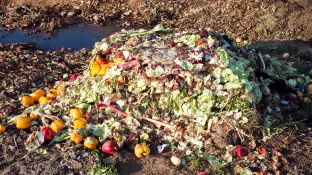Less food loss in fruit, vegetables and potatoes between the field and the store counter
Research project at a glance

Departments and Instituts
Funding type
Period
01.09.2016 to 31.12.2016
Project Description

In addition to the losses of fresh fruit and vegetables that occur within households, the losses that occur at the beginning of the value chain play a major role. If food is not used as such, the resources used for production (e.g. labor, land, energy, fertilizer and pesticides) and the environmental impacts of production (e.g. greenhouse gases, nitrate leaching) are not matched by corresponding benefits. Therefore, reducing losses is also important from an environmental perspective.
Products that are not harvested and incorporated in the field, or that are put to an alternative use within agriculture (e.g. composting, biogas, livestock feed), do not appear in the statistics. Thus, reliable data for quantifying food losses are lacking, especially at the beginning of the value chain. The reasons for food losses in this area have also hardly been investigated. Frequently discussed is the influence of governmental or private quality standards. But other factors, such as temporal fluctuations in supply or demand, also play a role. To reduce losses, knowledge of volume, timing (in the field, in storage, at grading), and reasons for losses are important, as well as existing strategies for reduction. Large differences between individual products can be expected due to product differences (e.g., store products vs. perishables).
Project Idea:
In a study, LANUV and the Bonn-Rhein-Sieg University of Applied Sciences want to investigate quantities of and reasons for food losses at the beginning of the value chain of fruit, vegetables and table potatoes in NRW, and also shed light on existing strategies for reducing losses. For this purpose, an online survey, expert interviews and a workshop with stakeholders from agriculture and trade as well as other experts (consulting, agricultural market monitoring, quality management of food retail) will be conducted. Based on the results, recommendations for agriculture and trade as well as for politics and administration will be developed.
Online Survey:
- Survey producers (agriculture)
- Survey wholesalers (traders, packers, sorters)
- Questions related to 1 product and own company
- to be answered within 10 minutes
- Focus: loss quantities (shares) and reasons
- In total exemplary to 6 to 10 products
Interviews with experts:
- Selected experts from production, wholesale, consulting, agricultural market monitoring, food retailing
- 30 to 60 minutes
- more qualitative than survey (reasons, avoidance strategies)
- related to the industry
Workshop:
- Participant group same as online survey + interviews, maximum 30 people.
- Focus: reasons and avoidance strategies
